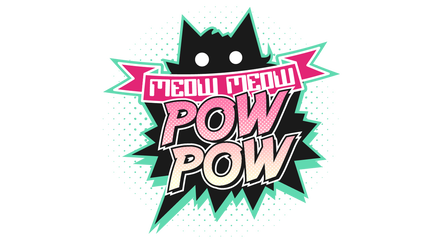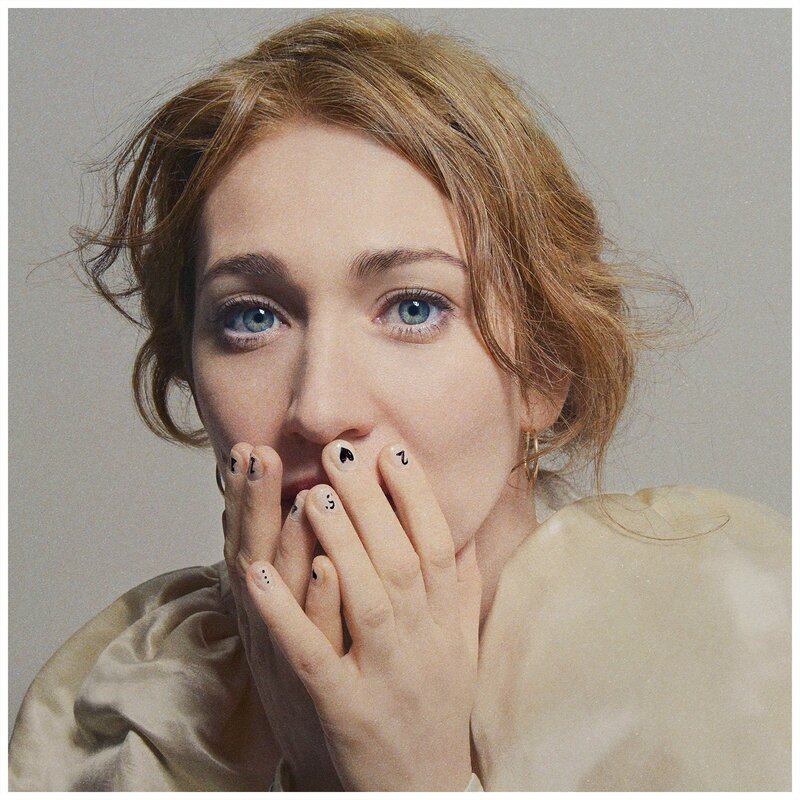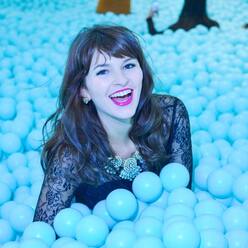|
7/5/2022 Reginaologyby Hattie Jean HayesWhen I was sixteen, I heard my first Regina Spektor song. My best friend Cassie, a dancer, invited me to her recital, and someone else in the company performed a beautiful dance to “Eet.” The dance itself was brilliant, and the choreography masterful; even as someone who is barely competent in basic, day-to-day locomotion, I could still describe each beat in detail. But the song. It began with soft piano, swelling up to meet an easy, lilting voice. My whole musical life, I had been trying to find one specific tone, an impalpable timbre that sat just beyond the edges of my consciousness. And then I heard the voice, and the lyrics. All of it was instantly familiar. It felt like something I’d known before. The moment it was over, and I found Cassie in the hallway, pulling on normal clothes, I asked about the song. “What was that?” I asked her. “Who was that?” “Oh,” Cassie replied, “that was Regina Spektor. I’ll make you a mix CD.” Cassie made me a CD, and that was the beginning. I remember sitting at Cassie’s kitchen counter, watching her painstakingly click and drag the tracks she would burn onto my special mix. Some were studio recordings and others were rips from YouTube videos, with audience members whispering and finishing their drinks in the background. This mix CD was where I first heard “Loveology.” “Loveology” is track nine on Regina’s recent album, Home, before and after, but plenty of fans – myself included – have had it memorized for years. By the time I discovered Regina Spektor’s music for myself, in 2010, it had been almost a decade since her self-released debut, 11:11. Regina is re-issuing that album this year in a special anniversary edition, along with a record called Papa’s Bootlegs, comprising twenty songs recorded by Regina’s father, Ilya, at her earliest shows. Bootlegs, from Ilya or otherwise, have long been a facet of Regina Spektor fan culture. On my first homemade Regina Spektor CD, Cassie added what was the most popular version of “Loveology” for at least 15 years, recorded at Tonic in New York City in October 2004. The song inhabited a strange space for many fans: Regina retired it from concert performances for around a decade, so only those lucky enough to have seen Regina play early in her career could say they’d heard it live. But then again, we’d only heard it live, in a bar, in a crowd. When Regina performed “Loveology” with the National Symphony Orchestra at the Kennedy Center in 2019, fans were thrilled to have a “proper” performance of the beloved piece, but shocked by the dissonance between old and new. “It's really nice to see so many people expressing their love for this song considering we were all listening to the same bad quality audio track with clanging dishes and audience chattering,” one commenter wrote on the YouTube video. “The one with the person who claps a bit too soon at the end,” recalls the first reply. “I’ve waited my life for a high quality cover of this song,” a viewer wrote. And I had, too – my adult life, at least. When What We Saw From the Cheap Seats came out in 2012, I had a year left of high school. I listened to the album for the first time on my bed, staring at the ceiling, with headphones in, absorbing it all. I had hoped to see Regina play live when she came through Kansas City on tour. For whatever reason, I missed Regina’s show in my area, and so listened to the album on repeat instead, watching clips of recordings and livestreams online when I could. After Cassie introduced me to Regina’s music, after I saved it all to my iPod so I could have it all the time, I passed the mix CD and the new album along to my father, who listened to them almost as religiously as I did. A few weeks before I left my Missouri hometown to attend college, my dad came to me and asked, “Do you listen to the song 'Small Town Moon' a lot?” I told him I did. “Does it make you sad?” he asked. I told him it did. “Well, baby, don’t you worry, worry,” he said, quoting the song at me. Then he grinned. “But be careful,” he continued, “because everybody not so nice, nice.” The song, I knew, made him think of me. It made me think of him. It includes the line, “How can I leave without hurting everyone that made me?” I spent the summer before college with that album, and the ones before it, and my family. When I moved to Arizona I didn’t know anyone. I bought a record player and the album I listened to most was Regina’s Live in London. I made friends and met neighbors. If they weren’t already Regina fans when we met, they learned the order of the songs on each album by listening with me. Remember Us to Life came out in 2016, on my 22nd birthday. Regina launched her solo tour in Arizona the following summer, but I missed that, too. I was moving to New York. The show was in New Jersey on a Friday night. I had been at my new, grown-up, magazine job for one pay period. Rent wasn’t due yet and I only needed one ticket. There was a New York show scheduled, too, but I had missed the chance to buy a ticket and the resale seats were too high. Even with my bus ticket, New Jersey was cheaper. Besides my family, I hadn’t told anyone I was going, because I didn’t know anyone in New York. Or, rather, I did know people, but I wasn’t ready for anyone there to know me, in the way they would if they came along. And I had waited years to see Regina live. I didn’t want to be distracted. I wanted to be greedy. It was November, and I walked from the bus station to the venue. The first thing I did was buy a t-shirt, and then go put it on, thoroughly uncool and enthusiastic. My solo seat was in the mezzanine, between two women in businesswear and a pair of teenage girls chaperoned by a father. There was a new dimension to the music, one that even the bootlegs from crowded bars in the early days of Regina’s career couldn’t capture: in the auditorium around me, everyone was singing quietly, under their collective breath, a body of work we knew by heart. I knew no one but I was welcome. I had resolved to something very out-of-character after the show. I was going to wait, outside, by the bus, to try and meet Regina Spektor. I shivered in the parking lot with three teenagers and their mother. It was all vaguely mafiaesque, the group of us cowering under the streetlights and the drifting snow. After an hour, the back door of the theatre opened. Regina Spektor walked out of that door. The teens’ fervent whispering increased in volume and pitch. I felt a little jealous, wishing that I could’ve been one of those kids in high school, staying out late with my mom’s permission to meet my hero, but before I could judge myself further she was smiling in front of me. Regina. “Hi, I have listened to your music since I was in high school,” I began, trying to remember other relevant facts about myself and my presence in this parking lot. “I moved to New York a couple months ago and the first thing I did was buy a ticket to this show, because I have never seen you in concert, and your music is the art that has had the most lasting impact on me, and it only seemed right to tell you in person. Thank you so much for being the person you are.” Regina Spektor laughed and pulled me in for a hug. She was bright and warm and smelled exactly like Swedish Fish. “Welcome to New York!” she said, even though we were in New Jersey. She went back to her tour bus, and I started my own trek to a different bus, but the teenagers and their mom pulled up alongside me and offered to drop me off at the station. By the time I got home to Queens, it was three in the morning. I slept the whole weekend long, and when I was awake, I listened to my mix CD. When I told my dad and Cassie about the concert, I told them that I had lingered, that Regina had hugged me, but I didn’t tell anyone else. Over the next two years, I saw Regina perform two more times. Every time, she performed a different selection of songs, new and old and never-before-heard. Regardless of my long history with Regina, I didn’t feel nostalgic hearing the songs I’d loved in high school. I still don’t. For me, nothing her music conjures needs to be remembered. Those emotions are still there, even if they have been edited and remastered and refined; these feelings are no less authentic for having grown up. When Regina announced her Broadway residency in 2019, I was filled with equal parts giddiness and dread. I had never been so scared about missing out on tickets. This sensation grew when I learned that every show of the five-night run would be slightly different, with surprise guests, different setlists, and new visual elements to accompany each song. I asked my then-boyfriend whether he would be offended if, instead of buying two tickets for one night’s show, I bought two individual tickets, for two different nights, and went by myself twice. I wanted to experience as much as possible, I explained, and I couldn’t justify spending money to see her every night of the series, but going to the first show and the last show seemed reasonable. He understood. In June, I headed to the Lunt-Fontanne for the very first show of the run. Despite my single ticket, I ended up sitting with some acquaintances in the high mezzanine seats, but by this time, I was not so precious about my concert experiences. The stage fit the dramatic setting, with a single spotlight illuminating a piano in the middle of the stage. To the right of the piano was a landscape familiar to me from other shows: a keyboard, space for a guitarist, and a capella wandering grounds. On the left, though, was a red platform that covered the ground. It was reserved for tap-dancing, which featured heavily in a new song debuted that night, "Spacetime Fairytale." This was the true Broadway spectacle I had hoped for. The opening show happened to be on World Refugee Day. Regina dedicated a cover song to her father, singing Nat King Cole’s "Smile,” honoring the family’s move from Moscow to New York almost exactly thirty years prior. Her keyboard player, Brad, took over the piano, and Regina walked across the stage as she sang to Ilya. “Smile, and maybe tomorrow,” she sang, light gleaming off her hair, “You'll see the sun come shining through for you.” The show closed with “Samson” as the encore. As Regina sat down and began playing, confetti snowflakes began falling down from the ceiling. The entire theater gasped: a moment of speechlessness after a night of reverent repetition. Slowly, the flakes covered her hair, the floor, and the piano. When Regina left for the evening, she left a snow-covered stage behind her, with a Regina-shaped empty spot on the piano bench. That week, I waited for the final show on June 26th. I was eager. I got to work early, so I could leave early, and I arrived at the Lunt-Fontanne very early. The weather was nice, so I went to a coffee shop around the corner and sat outside on the patio. As I people-watched, a slow trickle of Regina fans started arriving, some easily identifiable from VIP passes, others by demeanor. Someone once described Regina’s music to me as “the sonic equivalent of having bangs,” and while I think that’s reductive, there’s something to be said for recognizing oneself in a fandom community. One woman, passing by in big glasses and cute dangly earrings, summed it up best. As she walked past the patio, she grabbed her boyfriend’s arm, grinned, and exclaimed in a singsong voice, “Regina Spektor!” I chuckled as I felt the excitement flutter back up in my chest. It was easy to find my spot in the mezzanine, just a few seats down from where it had been the week before. On the way there, I recognized a woman in the aisle – the one from the sidewalk, with the earrings and the excitement. When I got to their row, I paused. “Excuse me, but I was sitting on a patio around the corner, and you walked past,” I said to her. “You kind of cheered, ‘Regina Spektor!’ and I just wanted to tell you, that is exactly what I’ve been thinking all day.” She and her boyfriend both laughed. Her name was Sam, and his was Scott. It was her second time seeing Regina, having seen her previously at Radio City. We talked for a minute or two, discussing the special guests that had come this week, and then I waved goodbye and found my seat a little bit above, and settled in. I hadn’t been sitting for long when someone tapped on my shoulder. It was Scott. When I looked up, he was holding a ticket out to me. “We’re meeting friends here, but we ended up with a single orchestra section seat,” he explained. “Why don’t you go ahead and take it? You’re a big fan, so you should have it.” I froze. “We can swap seats, and then our whole group can be in this row,” Scott added. “Are you sure?” I asked, a little breathless. He insisted. So I hugged them both, and I thanked them profusely, and I hurried down the stairs as fast as I could while shaking a little bit from the thrill. I am so, so glad I decided to come to two shows, I thought. This could not possibly get any better. My new orchestra spot was in a row of three seats, butting up against the sound booth, with mine being the innermost seat. It was cozy. It was perfect. There was a gentleman sitting on the aisle seat, and when he saw me, he stood so I could scoot in. “I’m not actually sitting here,” he explained kindly, “I’m just resting for a moment because I’ll be filming the show.” He was shorter than I am, and he had a slight accent. I realized there was a camera set up behind our little section. I smiled at him. “Oh, no worries at all!” I said. “I’m glad you’re filming the show,” I added, “I came to last Thursday’s, and it was magical.” “It was,” the man agreed. “I’ve been filming every show for the family archive. I’m Ilya, Regina’s father.” “I’m so sorry,” I said, “I don’t think I heard you correctly.” “I’m Ilya,” he repeated. “I’m Regina’s father.” I tried to stay composed. I gingerly rested my Playbill and my purse in my seat, and then I lifted my hands to wipe the tears spilling from my eyes. Ilya was, understandably, concerned. “I’m sorry,” I said once I could take a breath. “Excuse me, I just can’t believe I’m meeting you. Your daughter is the artist I admire most in the world. Thank you and your wife so much for the way you raised her.” “We just didn’t interfere,” Ilya said, smiling. Maybe I should not have been so moved when I met Regina Spektor’s father. After all, I met Regina herself. But that was an interaction I coaxed myself into seeking out, and waited in the snow for. It was the unlikely nature of my chance meeting with Ilya, which only happened because I was friendly towards a woman who walked past the coffee shop I was sitting at. It was the notion that, while Regina Spektor is the artist I admire most in the world, this was the person she admired, the person who supported her dreams, her hero. Ilya Spektor was kind. Very, very kind. As I would later learn in fan forums and Facebook groups, I was not the only person to receive such a warm welcome from Ilya. He asked me about my comedy and my writing. He told me about his son-in-law, Jack Dishel, then introduced me to Jack’s parents. They asked me about my family. I told them about Cassie. I told Ilya about my father. He introduced me to Bella, his wife. I told them about the bus I took to New Jersey, and Regina welcoming me to New York. The lights came down, and we all stopped talking. Once again, I was in the dark, by myself, but this time I was surrounded by Regina Spektor’s family, strangers who had looked at me and smiled. That would be Regina’s last show for a while. One year later, the Lunt-Fontanne and every other theater in New York was shut down. On Facebook, Ilya forwarded me a video about hand sanitizer and an article about staying safe during protests. The city was in lockdown, and I was writing poems. My poetry is not like Regina’s music, but then again, yes it is. The moments in both that make the most sense to me are the instances of intentional rhythm, and unguarded imagery that makes more sense if you just allow it to happen as written. I wrote a poem about Missouri and my father, and called it “Tornadoland,” after the Regina Spektor song I had been listening to while I wrote it. I sent it to Ilya. He sent a YouTube link of an orchestra covering “Pavlov’s Daughter,” a song from Regina’s first album, 11:11. Many of his posts, tags, and messages were like this – clips centered around Regina, or Jack, that I’d never seen before, but which Ilya shared proudly. Even after ten years as a fan, I had nothing on Ilya. When Papa’s Bootlegs was announced, I sent Ilya a brief note. “I saw the news and I knew instantly that it would be your recordings,” I wrote. It was 11/11/2021. I wished him and his family well. It would be our last interaction. A few days before Regina’s scheduled show at Carnegie Hall in April of 2022, ticketholders – including me – received a notice of postponement. When I received the email, my body turned cold and I felt sick to my stomach. There could only be a few reasons for a sudden cancellation like this. “I’m worried something happened to Ilya,” I texted my dad. Within hours, Regina’s team confirmed the horrible news on her social media. Ilya Spektor, her beloved father, had passed away. Even though I’d met him once and our exchanges totaled fewer than fifty messages, I felt a deep sense of loss for this man who had immediately extended his friendship to me. I confirmed the news to my own father, who was sad with and for me. The rescheduled show would be in mid-July, after the release of the album. Regina had announced the tracklist for Home, before and after. “Spacetime Fairytale,” the song she’d debuted during the residency, was there. So was “Raindrops,” which had never had a studio recording, which exists permanently as a YouTube lyric video bookmark on my computer. And so was “Loveology.” In the Facebook groups where Regina fans shared their own memories of Ilya’s kindness, and tried to coordinate selling their rescheduled Carnegie Hall show tickets, and posted scratchy bootlegs of rarely-heard songs, the community discussed “Loveology.” Like any fan community, there was disagreement, but in the Spektorverse, that discord is as civil and warm as you’ll ever see it. Many were excited to have the song as Regina imagined it. Just as many said they’d always be loyal to the clinking forks behind the opening piano, the little laugh after “porcupineology,” the person who claps three times, too early, in the final seconds of the song, before it fades to silence and is echoed by applause. At those early shows, which Ilya had recorded on VHS and which Regina later curated into Papa’s Bootlegs, the fans were part of the background noise. When laughing in amusement, when laughing in wonder. Even when clapping off-beat. What I miss about the “Loveology” bootleg is the final chorus, which the studio version slightly modifies. On the album version, Regina concludes the song by alternating “I’m sorry” and “forgive me.” “I'm sorry, forgive me, I'm sorry-ology,” she sings, then switches back: “Forgive me, I'm sorry, forgive-me-ology.” On the bootleg version, it’s both simpler and more complicated. Regina repeats herself, pleading: “forgive me, forgive me, forgive-me-ology,” before delivering the exact same coda again. It’s only a little different. But, no, it’s not. She’s asking for something. She’s not giving another apology. She wants to be forgiven, without offering anything in return. So do I, sometimes. I’ll probably switch back and forth between these versions, as I switch back and forth between these moods, the same way I have with every Regina Spektor song since that first mix CD. I settled in with Home, before and after, ready to listen to it in full, and expected to cry when I heard the studio recording of “Loveology” for the first time. Before I could even reach it, I was moved to tears. Two tracks earlier, the beginning of “Spacetime Fairytale” caught me by surprise. I hadn’t heard it since the Broadway show in 2019. “I woke up with you in my head,” Regina sang. The piano was instantly familiar. I felt myself there in the orchestra, hearing the song for the second time ever, Ilya silent at the camera behind me. “I should get up,” Regina sang on, “but I, instead, make a face you used to make.” In my bed, I closed my eyes against the overhead light and remembered a dozen versions of myself. By some miracle, all of us had experienced Regina Spektor’s music for the very first time, over and over again. And still, none of us had any idea what would happen next.
Comments are closed.
|
AuthorOur fabulous blog team Archives
June 2024
CategoriesAll 12 Songs Art Art And Athletes Book Review Chorus Blog Date This Book Game Of Narratives Guest Blog Letter From The Editor Lifehacks Movies Of 2019 Music Pup Sounds Smackdown Strive For 55 Summer Playlists |




 RSS Feed
RSS Feed